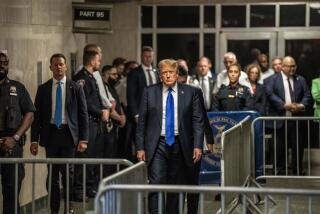White-Collar Defense Attorneys See New Trial Hurdles
- Share via
The five best words of advice for corporate executives under investigation these days could well be: He who hesitates is lost.
So say white-collar crime attorneys who have watched a cast of business chieftains -- from Martha Stewart to Frank Quattrone -- convicted in federal trials over the last year.
“In the industry of criminal white-collar defense, the thought in this day and age is that the most effective time for representing the client is prior to the indictment,” said Frank Razzano, a litigator with Dickstein Shapiro Morin & Oshinsky. “When the indictment comes down, the odds are against you.”
Indeed, U.S. prosecutors have compiled an extraordinary list of convictions or guilty pleas over the last year. Another win was notched Monday when former star investment banker Quattrone was convicted of obstruction of justice and witness tampering.
Other notable cases include Stewart, the domestic entrepreneur convicted of lying to investigators; Scott D. Sullivan, the former chief financial officer of WorldCom Inc. who pleaded guilty to fraud; Andrew S. Fastow, Enron Corp’s former CFO who pleaded guilty to fraud; and ImClone Systems Inc. founder Samuel D. Waksal, who also pleaded guilty to fraud.
Even defense attorneys credit prosecutors with making the most of their cases and finding novel ways to approach securities crimes, such as bringing obstruction charges.
But a number also said that defending an executive on trial in front of a jury has been made more difficult by the attention given to the corporate scandals of the 1990s.
“As defense counsel, I think the buzz among the community is there is significant concern that all the media attention paid to corporate fraud has made it more difficult to obtain an acquittal,” said Tim Hoeffner, a partner with Saul Ewing.
“Clearly, the easiest way to avoid that prejudice is to short-circuit the process and avoid getting an indictment.”
It is hardly a new theory. But lawyers say it has taken on a far greater importance in an environment where high-profile securities cases have proved nearly impossible to win.
Like a military maneuver, the approach relies on speed and diversion: React quickly, before the investigation goes too far, and point the finger elsewhere.
“If you represent a lower-level manager, you may point to conduct of a senior manager,” Hoeffner said. “If you represent a senior manager, you may point to lower-level employees.”
Another tactic is to convince prosecutors that their resources would be better spent on an easier case.
“A number of these cases have been based on aggressive legal theories,” Hoeffner said. “The job of a good defense attorney is to convince a prosecutor that this isn’t the place you want to spend your time pursuing aggressive legal theory.”
Several defense lawyers said their concerns were heightened by Quattrone’s conviction. A former banker famous for taking hot technology companies public, Quattrone’s first trial on charges of obstruction of justice and witness tampering ended with a hung jury in October.
But after less than eight hours of deliberations, jurors in his second trial returned with a guilty verdict on all three of the charges he faced. He will be sentenced in September.
“If I were someone on Wall Street, this would send a chill through my spine,” said Razzano, who formerly worked as an assistant U.S. attorney in New Jersey.
More to Read
Inside the business of entertainment
The Wide Shot brings you news, analysis and insights on everything from streaming wars to production — and what it all means for the future.
You may occasionally receive promotional content from the Los Angeles Times.










